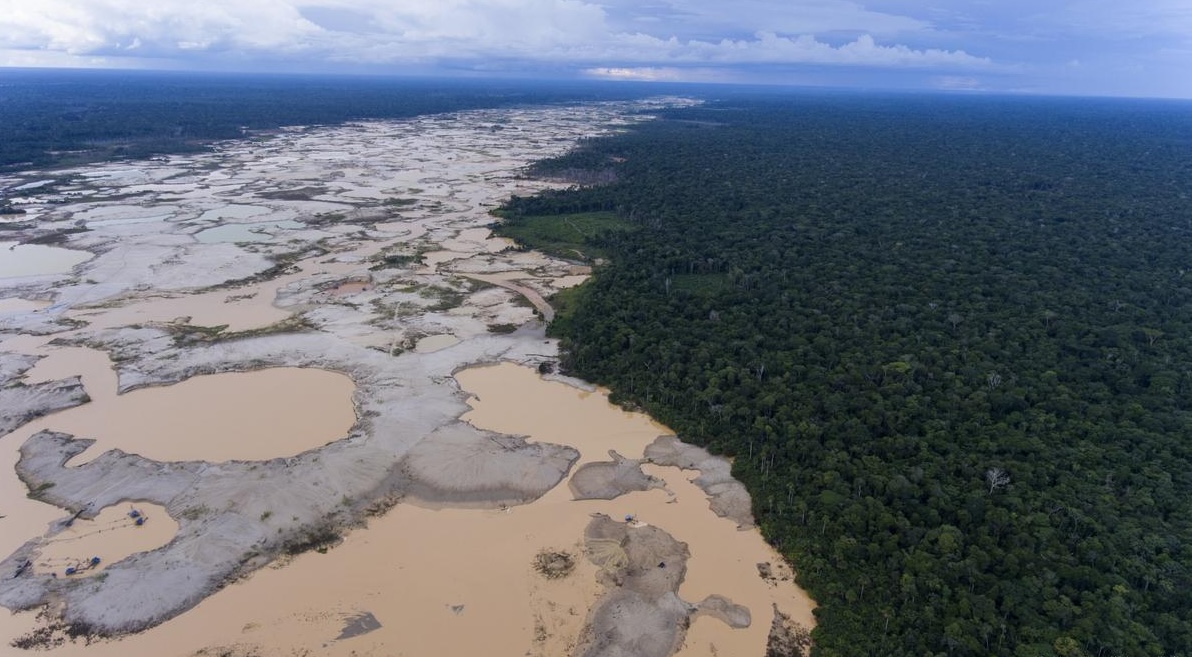The Struggle Against Illegal Mining and the Unforgotten Wounds of Big Oil in the Ecuadorian Amazon
by The Jungle Journal Team Click Here
Aerial view of the Ecuadorian Amazon and the impacts of illegal mining polluting waterways. Photo by R. Abdullah
Ecuador is known for being the first country on the planet to constitutionally guarantee legal rights to nature. The rights of nature legal framework was instituted in a new constitution drafted after the election of progressive president Rafael Correa in 2008, whose coalition’s cornerstone was the highly politically organized Ecuadorian indigenous movement (CONAIE). Through the political force of the indigenous movement, the new constitution also implemented Ecuador’s self identification as a plurinational state, meaning formal recognition of the sovereignty of indigenous peoples over their territories.
In practice, over the last 17 years, affirming the sovereignty of indigenous people in Ecuador, and transitioning to a ‘post-extractivism’ economy, has not materialized in alignment with the aspirations of the 2008 constitution. Today, this is exemplified clearly by the continuation of both legal and illegal ecologically destructive mining projects across the country, especially in the Cordillera del Condor region, where 54% of the territory is conceded to legal mining operations and over 20 illegal mining operations have been detected in the National Protected Areas System.
Illegal gold mining in the Western Ecuadorian Amazon has expanded its scope in recent years, resulting in upsurges in both criminal activity and ecological destruction across territory inhabited by indigenous communities. While three large mining corporations hold the necessary territorial concessions from the Ecuadorian state, the relaxed regulation of the Ecuadorian state under the Noboa administration, and the opaque structure of these “simplified joint stock firms” have allowed for small scale illegal gold mining and drug trafficking money laundering to operate behind the scenes of the gold business.
The anti-extractivist Sumak Kawsay framework implemented in the 2008 constitution expressed the hopes of the people to end the economic exploitation of the Ecuadorian Amazon, and to build a national economy predicated on balance with the living world. However, while the crisis of rampant and poorly regulated gold mining in Ecuador demonstrates the shortcomings of realizing the rights of nature as a political reality, it should serve to galvanize the movements fighting to fulfil its potential.
Indigenous communities inhabiting the Ecuadorian Amazon have suffered the consequences of resource extraction for decades, but have also consistently met them with fierce opposition. Instances of environmentally destructive resource exploitation, beginning with the the sale of vast tracts of land for oil and mineral concessions in the 1960’s and 1970’s, prompted a renewed political resistance of Ecuador’s large, and historically sidelined indigenous population in the form of anti-extractivist Sumak Kawsay/Buen Vivir.
The Texaco/Chevron oil spills (1964-1992), when Texaco knowingly dumped 18 billion gallons of toxic waste water and spilled 17 million gallons of crude oil into the Ecuadorian Amazon, serves as one such concrete example representing the legacy of extractivism in Ecuador. Such destruction has served to mobilize indigenous communities and settlers alike against extractivism, serving as the base of the democratic coalition which crafted the 2008 constitution. Today, despite this monumental legal advancement, the livelihoods of indigenous communities remain at a grave risk due to water contamination and ecosystem destruction caused by extractive activities including gold mining, oil drilling, forestry, and others. The struggle to protect Ecuador’s wealth of ecosystems and the indigenous communities inhabiting them is ongoing, and therefore raising awareness about these issues crucial to indigenous rights and ecological flourishing is a necessity.
Sources:
“Minería ilegal en Ecuador: La Guerra Silenciosa”, NAPO Resiste, March 12, 2025.
ARTURO TORRES, DAN COLLYNS, “In Ecuador, booming profits in small-scale gold mining reveal a tainted industry – investigation”, Mongabay, October 3 2024.
Thea Riofrancos. “From Neoliberalismo to Extractivismo: The Dialectic of Governance and Critique.” In Resource Radicals, 1-. Duke University Press, 2020, 30-31.
“Chevron wins Ecuador rainforest ‘oil dumping’ case”, BBC, September 7, 2018.
Subscribe To Our Newsletter
Subscribe for exclusive insights, upcoming panels, inspiring stories, and opportunities to support communities driving real change.